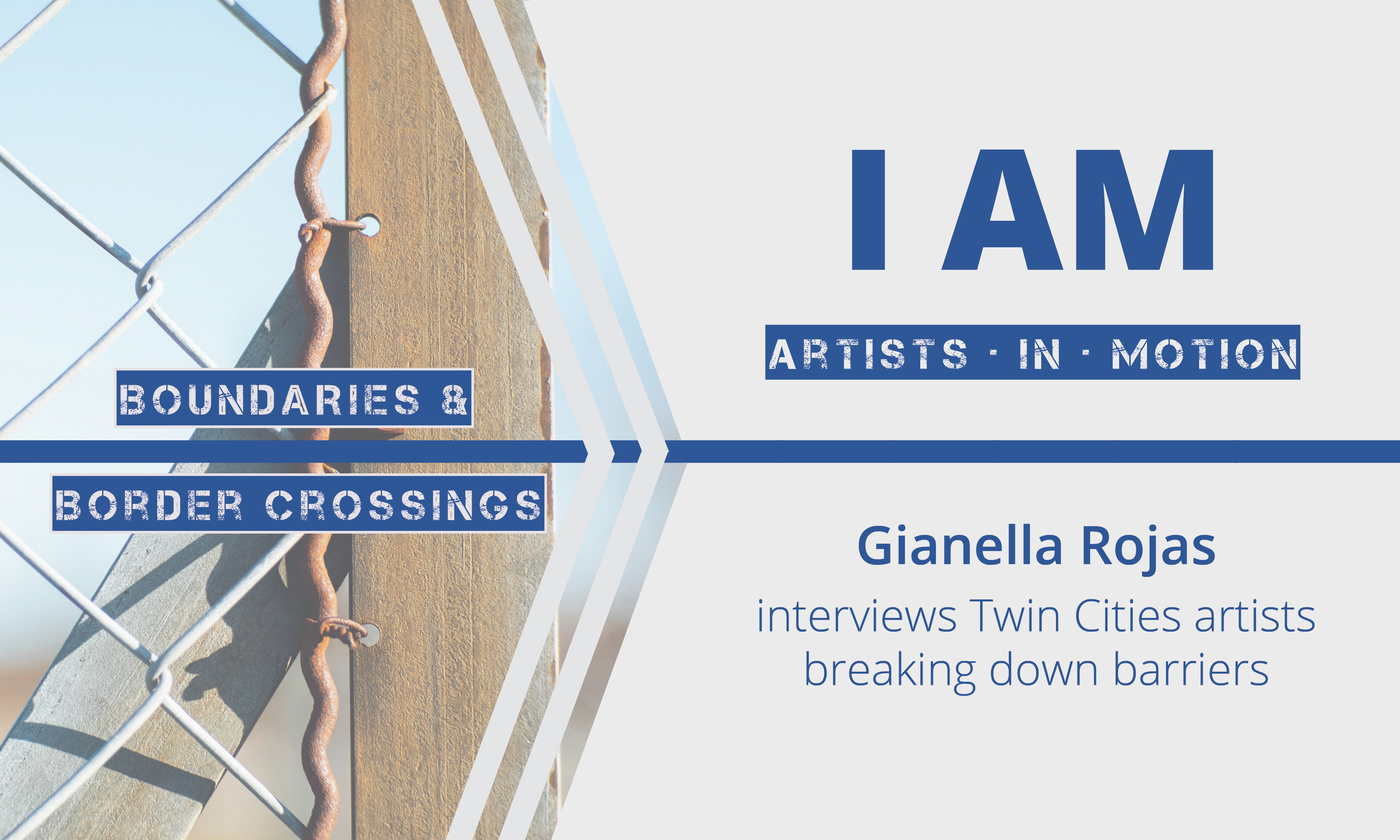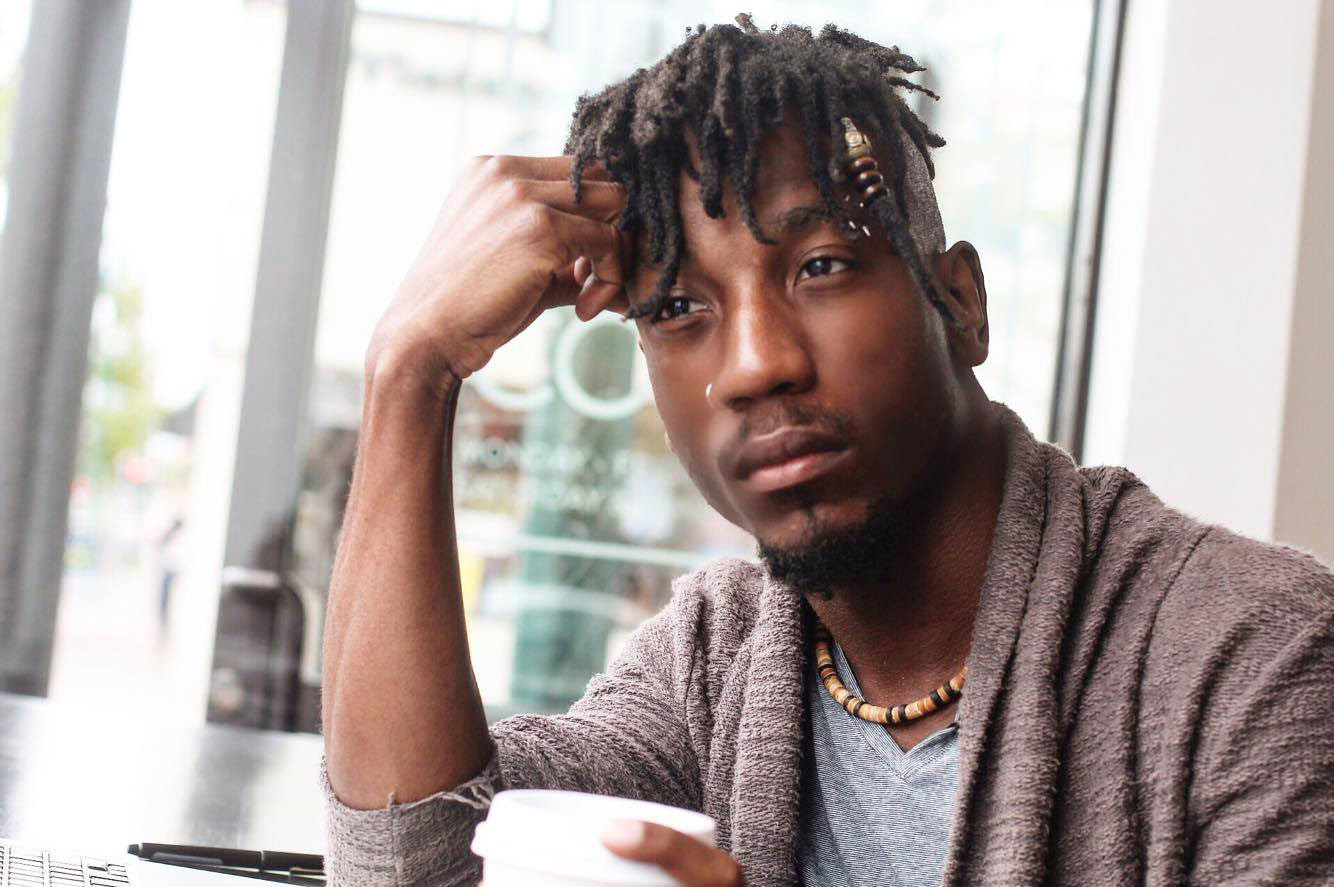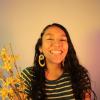Interview with Keno Evol

I AM (Artist in Motion) is an interview series meant to spotlight indigenous artists and artists of color in the Twin Cities. I had the privilege of working at the Loft as the fall 2019 marketing and communications intern, and when they gave me the chance to work on a project of my choosing, I AM is the first thing I thought of.
The artists in this series were people I found truly inspiring. They incorporate art into their lives in many different ways and expressions, finding time whenever or wherever they can. They show how art can be a form of healing, understanding, and moving forward. I hope you take in their words and feel that for yourself.
________________________________________________________

Keno Evol is a poet, educator, and scholar of insurgent possibilities based in Minneapolis, Minnesota. He serves as the founder and executive director of Black Table Arts, home to the Because Black Life Conference, which takes place annually at the University of Minnesota. He is editor of A Garden Of Black Joy: Global Poetry From The Edges of Liberation And Living. At his core, he is a facilitator of empathy and imagination. His work hones in on the literary arts and the black radical tradition as curriculum for the future. Evol won first place in the 2017 Sonia Sanchez-Langston Hughes Poetry Contest and has received the Verve Grant, the Beyond the Pure fellowship, the Emerging Writers Grant, and the Spoken Word Immersion Fellowship for his work.
What modes or mode of storytelling do you use, and how is this approach a unique way of telling a story?
I’m Keno Evol. I’m a poet. I’m a founder and director of Black Table Arts. What we do in the organization is hold space for community and try to put black joy on legs through the arts. We think about what history, gathering, and artistic practice have to say about the future that we want. My point of departure is poetry. So in the spaces that we hold in community, I always spotlight poetry. For that, what we think about is poets not only as the people who write poetry but as this sort of larger encompassing definition that this artistic movement, surrealism, used to define a poet, which was someone who is able to conceive of imagination and empathy as a poetic posture to being in community. We think about that, but we also think about Gwendolyn Brooks. Nineteen-sixty-five coins the term "verse journalism," so using poetics as a way to journal what is going on in the community. So we begin at those two points of departures, 1965 and 1910s, 1920s, when surrealism took off. We think that art has something to say.
Specifically, I’m rooted in spoken word, poetry written with the intent to be performed. That is always a way in which we invite community into our spaces, an invitation to perform their poems. So that’s our mode of storytelling. It’s this sankofa ability. What I mean by that is using poetry as a way to look to the past and look to the future at the same time. So sankofa is a sort of Janus face—past, present—artistic exercise that we try to get community to participate in. We do that through the Black Lines Matter writing program that happens here every other Saturday, room 303, six to eight p.m.,* and then we do the Free By Table Open Mic, Chai & Chill.* All of this is in effort to center black poets and black poetry.
How does your approach change when you’re writing poetry on a page versus as spoken word?
For me, I actually haven’t written in a while. I wrote a poem the other night, but it’d been a long time. I run a nonprofit, so a lot of my time, unfortunately and fortunately, is grant writing. I wrote maybe two grants in the past week and a half. Page poetry, for me, I think the time spent is different. For a page poem, I think I take a longer time thinking about—well, one, thinking about how it’s going to appear on the page as opposed to a lot of my spoken word. It's more performance based because it's written with the intention to be performed. I’m not worried so much about how it appears on the page, because most people won’t see that page. When it’s spoken word, I center more on cadence and syntax, so rhythm and how words sound. When it’s page stuff, it’s more short lined: How does it appear on the page? How is it an experience for the reader as opposed to the listener? So the language is more concentrated I think when it’s a page poem.
What is your process in creating and performing art?
I have to listen. I have to be a good listener. A poem, the definition is a piece of writing that partakes in the nature of both speech and song. So I have to listen to the song. What I mean by that is environment and community. I have to listen to what’s going on around me so I can write in a way that’s intense and beautiful and people like it. And then you know, poetry has a longer definition, but a part of the definition is concentrated imaginative awareness. You have to be able to be in tune with your surroundings so that you can write about them. For me, that process looks like being a good listener, being a good observer, so verse journalism—the poet as a fly on the wall. You have to be able to have insight. You have to be able to have a keen eye. Your senses have to be activated to be able to report back whatever your experience was. I have to be a good listener, so I really try to listen to what people say in conversation, but particularly the relationships that are close to me. My folks, my siblings, they really inspire a lot of my writing. A lot of my poetry actually is just repeating what other people have said to me in conversation that maybe, at the moment, didn’t register for them as a poetic moment. But for me, listening as a poet, I’m like, "That’s a poem."
How do your stories connect to your identity? How do they connect you to your community?
I’m thinking of a particular quote by one of my favorite poets, Audre Lorde. I don’t want to mess it up. It’s at the end of a poem that she wrote, "To the Poet Who Happens to Be Black and the Black Poet Who Happens to be Woman." "I cannot recall the words of my first poem / but I remember a promise / I made my pen / never to leave it / lying / in somebody else’s blood.” For Audre, she wanted you to know that if you ever read one of her poems, it was an extension of herself. It’s a first kind of resource of a reporting of someone’s life. It’s me; it’s a mirror. I think that it is foundational, but it’s not self-evident. So you shouldn’t assume that the subject of the poem is the person who wrote the poem. It could be, but we don’t know. That’s a position some people take. This person in this poem is me, or it's reflective of my people and our culture and our history. For me, that’s very important because I have a great empathy for black folks, for my people, so when I think about the ability for me to speak to my condition of living in America or others' experience of living in America. It’s exciting. It’s not always stressful. It’s abundant. I think it’s a way of connecting to other people. And to say things out loud—some things people don’t say out loud but maybe should.
What would you say to artists that are just starting to learn how to connect themselves to their art?
For poets, in a way, you’re never writing the final draft. Take the weight off your shoulders. Just write. Get into that activity to dig up and sculpt what the most true, honest expression of that experience is. So just write, really. And then read. One of my favorite writers, Ralph Waldo Emerson, said books are not systems, they’re satellites. Travel, write, read. Read repeatedly. Know that there are others. Let yourself be in room with others. Be in community spaces. This is all very important because you develop relationships that travel with you, sharpen you; steel sharpens steel. Then find mentors. Get feedback on your writing from people who have written, who know techniques. Travel through books, get feedback, be in community.
How did you get into spoken word?
I got into spoken word in high school through programs. I think saying that is important because we need to fund programs. We need to fund art programs. Art programs get young people to think about the world, about their history and future. It jumpstarts their career. Art programs are very important, such as TruArtSpeaks and Be Heard MN Youth Poetry Slam series. They send a team of young people from Minnesota to this global poetry slam. I went two years in high school. That program is really where I got started as a young person. Going to open mics, going to art programs, and really thinking about a larger project of freedom. What is the program that gets people to think about coming out from under constraints in policy, education?
Why do you do what you do?
One of my favorite poets was a surrealist who described surrealism as this movement emerging between the wars. Surrealism emerged between World War I and World War II in France. What she said in this essay was that splendor and hope awaits us. For me, I think about poetry as Percy Shelley defined it, an expression, an extension of the imagination. I do what I do because I’m excited for the future. I think we have a lot of work to do to make the world better, but I do it from a place of excitement and in a place to engage with other people. It’s the ability to engage with other people. We live in a moment where people don’t want to engage with other people. Or people are trying to stop people from engaging with other people. But art says no, you have to engage. Art says what do you want to create? And not only what do you want to create but that you can create something. It has us think about if we’re rooted in a Gwendolyn Brooks ethics. What are the ethics of what we want to create, what we’re creating, and how we’re creating? How we are treating other people is the question of a poet. Again, that surrealist definition: empathy and imagination. You have to think about how you treat other people if you consider that to be the definition of a poet. So I’m excited. I’m excited, which isn’t me saying that there aren’t heavy things in the world or things that are troubling. It just says that they won’t have the last word.
*This interview was performed before the COVID19 pandemic, and thus the events listed are on hiatus.
